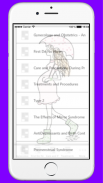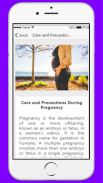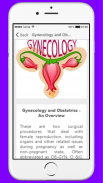






Gynecology and Obstetrics Learning

Gynecology and Obstetrics Learning ਦਾ ਵੇਰਵਾ
Gynecology and Obstetrics Pregnancy is the development of one or more offspring, known as an embryo or fetus, in a woman's uterus. It is the common name for gestation in humans. A multiple pregnancy involves more than one embryo or fetus in a single pregnancy, such as with twins.
In this app we will discuss:
How do you know your pregnant
How soon can i take a pregnancy test
How accurate are pregnancy
how to conceive a baby boy
Pregnancy week by week
pregnancy after cesarean
Monthly pregnancy
pregnancy after birth
pregnancy by trimester
pregnancy after 40
Pregnancy with endometriosis
calculate pregnancy
pregnancy dream book
pregnancy after abortion
First pregnancy
First signs of pregnancy
Pregnancy test
Early pregnancy
Definition of term pregnancy
Stomach during pregnancy
What is and what is not during pregnancy
Pregnancy and childbirth
Trimesters of pregnancy
teenage pregnancy counseling
signs of pregnancies
pregnancies test
Pain during pregnancy
Pregnancy calculator
Pregnancy symptoms
pregnancies symptoms
Pregnancy week by week
Deciding to have a baby
Contraception information
Calendar of pregnancy by weeks.
Pregnancy test checker free
Pregnant or trying to get pregnant
Planning pregnancy
Getting pregnant (conception)
Confirming you are pregnant
pregnancy from conception to birth
pregnancy plus
feature on the app
_ update once a week
_ useful tips that you will provide
_ a very simple look in the app.
little explanation about
Most pregnancies last from 37 to about 42 weeks. Health care professionals calculate the delivery date 40 weeks from the date of conception (the date the sperm and egg fused). According to the National Health Service, UK, only about 1 in every 20 births actually takes place on the due date. A baby who is born before 37 weeks after conception is considered pre-term (premature) and babies born after the 43 week mark are considered post-mature.
Symptoms of pregnancy
Every woman is different. So are her experiences of pregnancy. Pregnancy symptoms differ from woman to woman and pregnancy to pregnancy; however, one of the most significant pregnancy symptoms is a delayed or missed period. Understanding the signs and symptoms of pregnancy is important because each symptom may be related to something other than pregnancy. You may experience signs or symptoms of pregnancy within a week of conception. However, it is possible you may not experience any symptoms for a few weeks. Most common signs of pregnancy are:
Missed period
Nausea with or without vomiting
Tiredness
Dizziness
Breast changes
Breast tenderness
Frequent urination
Headaches and back pain
Mood Swings
Constipation
Nausea generally affects pregnant women during the first three to four months of the pregnancy. Tiredness tends to be more acute during the first and last three months. You can be pregnant without experiencing any of these signs and symptoms.
Pregnancy Test
All pregnancy tests work by detecting a certain hormone in the urine or blood that is only there when a woman is pregnant.
The Three Trimesters of Pregnancy
The development of pregnancy is counted from the first day of the woman's last normal period, even though the development of the fetus does not begin until conception.
Complications during pregnancy
There are several things that may cause a complication in your pregnancy. However, some are more common than others. Mother's body has a great deal to do during pregnancy. Sometimes the changes taking place will cause irritation or discomfort, and on occasions they may seem quite alarming.
The complications that require immediate attention and care includes:
Miscarriage
Premature labor and birth
Preeclampsia
Low amniotic fluid (oligohydramnios)
Gestational diabetes
Ectopic pregnancy
Placenta previa
Having a baby is an exciting time for all expectant mothers. Whether you are a first time mother or adding to your family, your experience is personal and unique.

























